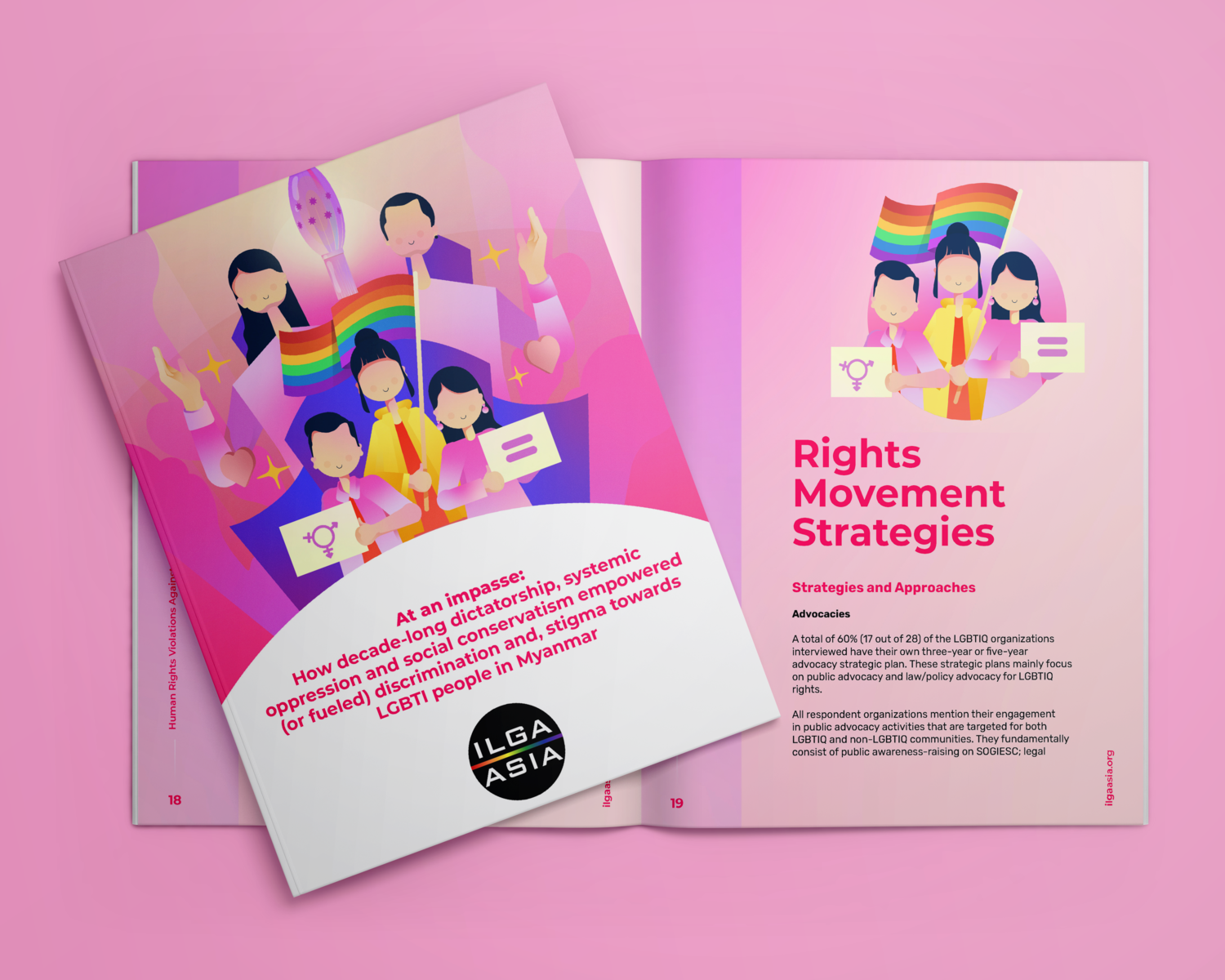At an impasse: How decade-long dictatorship, systemic oppression and social conservatism empowered (or fueled) discrimination and, stigma towards LGBTI people in Myanmar


Executive Summary
This study shows that many LGBTIQ persons are subject to violations of human rights set forth in Universal Declaration of Human Rights – mainly “freedom from discriminations”, “freedom from torture and degrading treatments”, “right to recognition as a person before the law”, “right to equality before the law”, “freedom from arbitrary arrest and exile”, “right to marriage and family”, “freedom of belief and religion”, “right to desirable work”, “right to education” and “right to participate in the cultural life of the community”.
Despite domestic legal frameworks enacted to implement international human rights conventions such as CEDAW and CRC, many LGBTIQ persons in Myanmar also do not enjoy the rights enshrined in those conventions including those mentioned under other international human rights law such as ICCPR and ICESCR.
Homophobia and transphobia are deeply rooted and are often followed by a range of physical, emotional, sexual violence and economic abuses against LGBTIQ youths. An online survey conducted by LGBTIQ organizations showed that the rate of domestic violence and family violence exponentially escalated during the unprecedented times of the COVID-19 pandemic. Transgender and gender-queer persons are also discriminated against and mistreated in public and private services and functions.
In the economic sector, many LGBTIQ people are not granted equal rights, opportunities, or remuneration like any other employees. LGBTIQ people are verbally, physically and sexually assaulted by their supervisors and fellow colleagues, and their employment institutions fail to defend their rights. In the education sector and learning institutions, LGBTIQ students are oppressed, bullied, excluded, or neglected by their fellow students and learners – mainly based on the grounds of their SOGIESC. These acts can include physical and psychological violence, verbal abuse and sometimes, sexual harassment and exploitation. These practices have negative impacts on their physical and psychological well-being and social lives.
In the healthcare sector, LGBTIQ individuals, especially transgender persons and LGBTIQ people living with HIV who are stigmatized and assumed as “spreaders of HIV and other sexually transmitted diseases.” They are mistreated especially by the caregivers – doctors, nurses and aides and other staff – in healthcare/medical institutions or facilities such as private, public, or governmental hospitals and clinics. Furthermore, LGBTIQ people living with HIV do not have sufficient access to clinics and physicians and HIV medications in rural and remote areas.
Clergypersons and other religious community members exhibit behaviours of rejection against LGBTIQ people, especially trans people in their religious activities and even on religious grounds in some cases. Some are treated as inferior sub-humans or are forced to conform to cisgender norms. In some other cases, discrimination in the religion or belief sector is associated with “conversion therapy” that aims to cure homosexuality or bisexuality to return to the state of heterosexuality.
The dimension of lobbying activities of LGBTIQ organizations in Myanmar primarily diverges on legal reforms and implementation; leading the advocacy for the amendment of section 377 of the Penal Code, along with other LGBTIQ organizations across the country. Some organisations would engage directly with international human rights mechanisms. These include submission of shadow reports to UNHRC’s UPR mechanism, submission of thematic reports to CEDAW committee, and collaboration with UN agencies in Myanmar – such as UNICEF, UN Women and UNDP – to support LGBTIQ-related data and information.
Myanmar’s major emerging LGBTIQ organizations are established on a voluntary basis and informal settings. Despite that the needs required to form a stronger alliance have been identified, varying capacities and experiences of LGBTIQ organizations remain a barrier to form stronger alliances.
Respondents from the research also firmly believe that the National Youth Policy, which has defined “LGBTIQ youth” as “groups to be prioritized”, is a beacon that will lead to more government accountability and public awareness on sexually diverse minorities. The increased popularity of LGBTIQ social media influencers, celebrities and icons have opened the eyes of the public on sexual orientation and gender identity. Respondents also mentioned that increased tolerance and acceptance of the general public on LGBTIQ people in urban populations would create more flexibility to advocate for LGBTIQ rights in the future.

